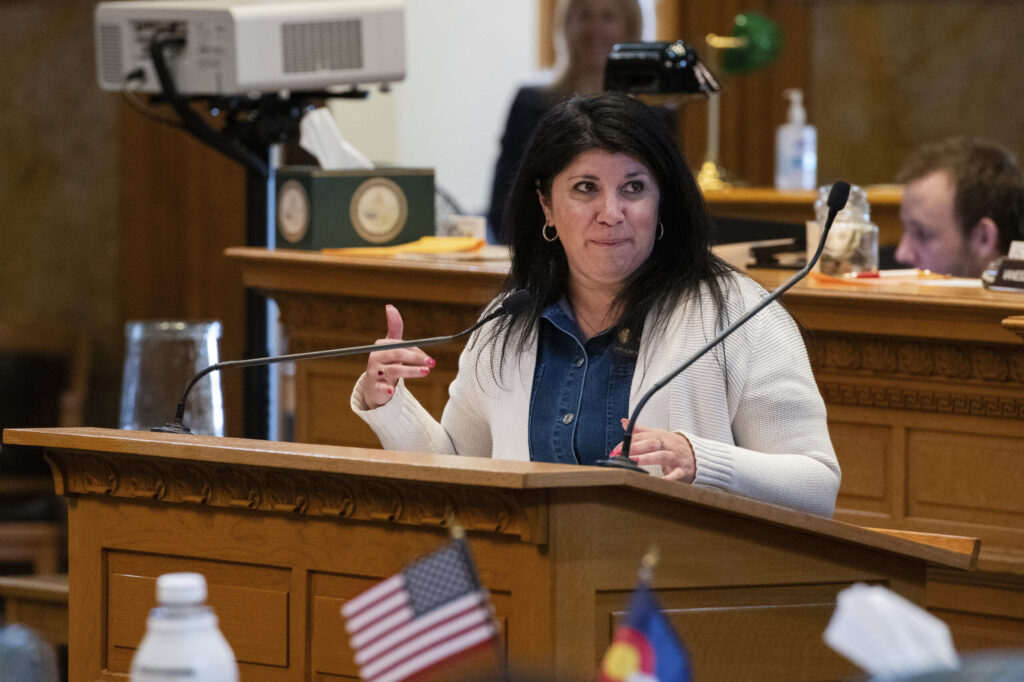Bill to require actuarial analysis of health benefit additions could succeed after several tries

It’s taken three tries, but legislation requiring a review of how much a new health benefit could add to the costs of health insurance premiums has its best chance ever of making it to the governor’s desk.
Sen. Jim Smallwood, a Parker Republican and insurance broker, has been trying for three years to find a path forward on legislation requiring actuarial analyses of health benefits that the General Assembly wants to add as mandates to health insurance coverage. Senate Bill 40 could finally be that vehicle.
An actuarial analysis, as described by SB 40, would show just how much a proposed mandate would add to the cost of health insurance premiums. Over the past several years, lawmakers have mandated insurers cover the cost of infertility treatments, annual mental health exams, insulin, noninvasive screenings for breast cancer and HIV prevention medications.
Under Senate Bill 40, the Division of Insurance would be required to hire a third-party contractor who would conduct up to five reviews per year on benefit mandates being proposed by the General Assembly. Those reviews would be required to identify how much the new benefit would cost at five years and 10 years after enactment. The review could also look at legislation that seeks to reduce or eliminate benefit coverage.
The bill states those reviews must include an estimate of how many Colorado residents would use the benefit; changes in consumer costs, such as co-pays; how much the new benefit would drive in higher health insurance premiums; and social and economic impacts, if available.
Requests for review, however, would have to be done well before the beginning of the legislative session. The bill sets a deadline of Sept. 1 for the following legislative session.
SB 40 does not include Medicaid or the Children’s Health Plan+, although Smallwood said mandate reviews for those programs are already included in fiscal notes since higher costs become part of state expenditures.
The bill also divides the requests along political lines. Up to two members of the majority party in the House and Senate can request reviews, while only one member of the minority party of each chamber could seek a review.
A major change from previous versions is that the reviews only need approval by the majority leaders of each chamber if they receive more than two requests from majority members. Caucus leaders would then notify the Division of Insurance by Sept. 15 which reviews had been approved.
Legislation that receives an analysis would also include a statement in its fiscal note that an analysis has been conducted and available upon request.
Smallwood told Colorado Politics he’s fine with the report not being part of the fiscal note, indicating that those reports will help lawmakers figure out if the way they’ve drafted the bill accomplishes its goals. He said he wouldn’t want those reports to be public prior to the bill’s introduction, where it could be used to weaponize against the bill, and that he views the report as something akin to work product.
“If the results of the actuarial review aren’t what I anticipated, I would want the flexibility to make adjustments to the bill to make sure it does what I intend it to do,” Smallwood explained.
The analysis is favored by the Polis administration. Twice in the last two years, Polis warned lawmakers that he did not want to see any more health insurance mandates unless there were cost savings to be had as a result.
In a signing statement last year on mandatory mental health coverage, Polis reiterated his request to the legislature to stop sending him mandates.
He approved House Bill 21-1276 because of of other savings on health care the legislature had passed during the session.
“I am proud of what we have done together and also mindful that we cannot give with one hand and take away with the other,” Polis wrote in his signing statement. “Mandates have the potential to add extraordinary value to the consumer. They also have the potential to put insurance and its benefits out of reach for the very people who need that coverage.”
The governor has also expressed support for the actuarial analysis that Smallwood has been pushing for during the past three sessions. But getting those two previous attempts out of Senate Appropriations has been the biggest hurdle. The costs for the previous bills were $138,000 or less, but the 2022 version has a price tag of more than $283,000 and yet won unanimous approval on Monday.
Smallwood said the issue was never about the cost and that previous versions died in the appropriations committees because it was the last stop for the bill before coming to the Senate floor. The concerns in prior years dealt with “outside influencers who would drive those requests,” Smallwood said. Another problem, Smallwood said, is that an amendment on last year’s bill indicated members of either party could be blocked from making those requests due to the need for majority leader approval.
The issue of adding benefits, and the costs that go with it, is being watched now more than ever, with the passage last year of the Colorado Option bill. That law requires health insurers and hospitals to reduce costs with a goal of reducing premiums by 15% over the next three years.
Health insurers said adding benefits adds costs at a time when they’re trying to reduce costs in order to meet the goals set under the option law. Another bill working its way through the General Assembly this year, House Bill 1370, would require insurers and pharmacy benefit managers to pass along rebates they get for bulk purchasing of some of the most expensive drugs to consumers or small businesses, but insurers have said the legislation would sabotage their attempts to lower costs.
“This bill is intended to be a tool for legislators to make good decisions around health policy, particularly in the commercial insurance space,” which is the individual, small and large group health insurance markets, Smallwood said.
SB 40 won a 35-0 vote from the Senate on Tuesday and is now in front of the House Health & Insurance Committee, where its chair, Rep. Susan Lontine, D-Denver, is one of the bill’s House sponsors.













